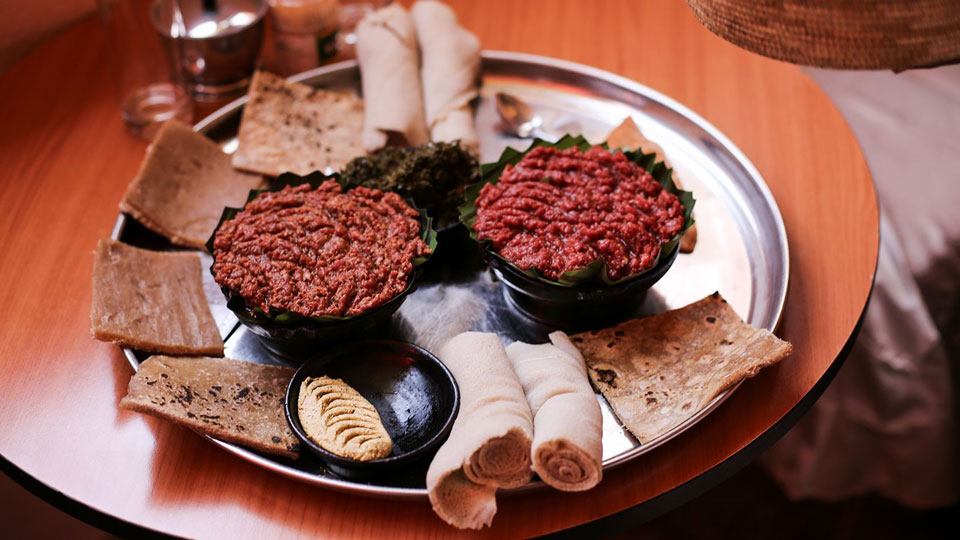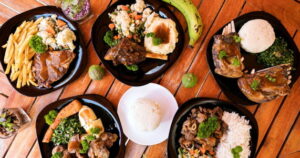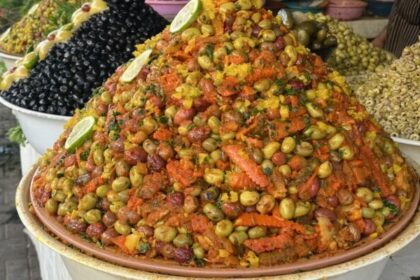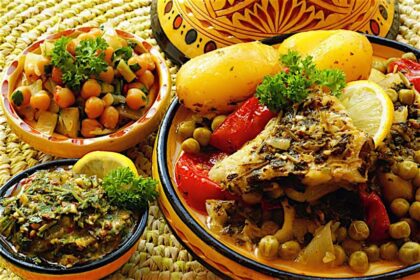Table of Contents
1. Yod Abyssinia Traditional Restaurant (Addis Ababa)
2. Kategna Restaurant (Addis Ababa)
3. Dashen Traditional Restaurant (Addis Ababa)
4. Makush Restaurant (Gondar)
5. Lucy Restaurant (Lalibela)
Overview of Africa Tourism – Best Food Places You’ve Got to Visit in Ethiopia
How to Choose Africa Tourism – Best Food Places You’ve Got to Visit in Ethiopia
Pros and Cons of Africa Tourism – Best Food Places You’ve Got to Visit in Ethiopia
What to watch out for
Pro Tips
Recap
1. Yod Abyssinia Traditional Restaurant (Addis Ababa)
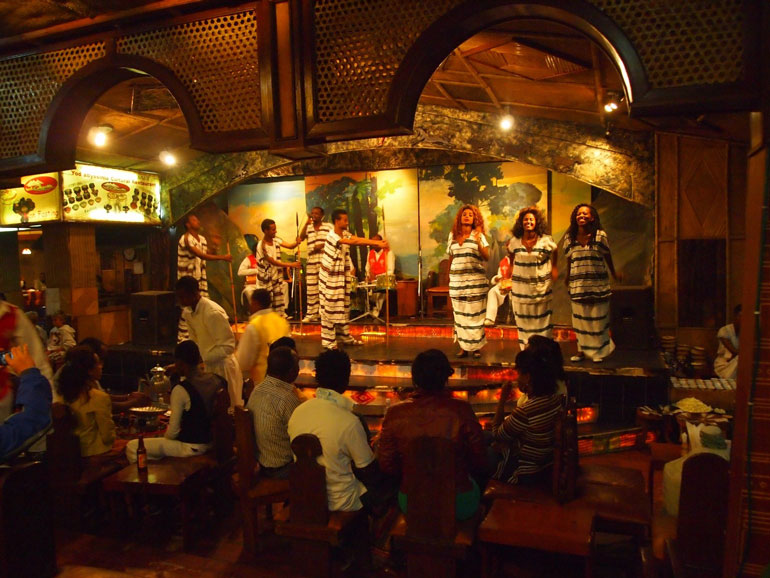
Renowned Yod Abyssinia Traditional Restaurant in Addis Ababa is a lively eatery where you may sample a variety of Ethiopian dishes from different parts of the country. It’s an excellent way to learn about Ethiopian cuisine and culture because they also have workers dressed traditionally and cultural performances.
Culinary experience:
- Offers an opportunity to savor a wide range of traditional dishes representing the culinary landscape of Ethiopia. This is a perfect opportunity to try something new and broaden your taste buds.
- Known for its authentic flavor due to its focus on using fresh, local ingredients to create authentic Ethiopian flavours.
Cultural Immersion:
- Traditional Ethiopian artwork adorns the restaurant, and staff members are costumed traditionally, drawing you even deeper into the culture.
- Witness live music and dance performances showcasing Ethiopian cultural heritage. This adds another dimension to your dining experience and provides a deeper understanding of Ethiopian traditions.
Additional Benefits:
- Highly rated: Yod Abyssinia’s cuisine, service, and ambience have all earned it consistent praise. This implies a dependable and delightful eating experience.
- Excellent introduction: Yod Abyssinia’s varied menu and cultural touches make it an excellent place to start if you’re new to Ethiopian food.
Focus on Experience over Ambiance:
- Tourist-oriented: Yod Abyssinia may feel less genuine than a local eatery because it mostly serves tourists.
- Inauthenticity risk: Since entertainment is the main focus, there’s a potential that the cultural performances could come off as produced rather than organic to the dining experience.
Food and Price:
- Possible higher prices: Yod Abyssinia may charge more than other Ethiopian eateries in the area because it caters to foreigners.
- Cuisine quality: Although the cuisine has received positive ratings overall, certain reviews may point out inconsistent portion sizes or quality.
Other Considerations:
- Huge crowds: The restaurant may get packed as a result of its popularity, which could affect the dining experience.
- Limited dietary selections: Compared to a more specialized restaurant, it could be more difficult to locate appropriate selections on the menu if you have dietary limitations beyond vegetarianism.
- This Ethiopian restaurant offers a vibrant and cultural atmosphere with traditional Ethiopian decor and staff dressed in customary clothing.
- It serves a wide variety of Ethiopian dishes, including vegetarian options, stews, and meat dishes.
- The restaurant also hosts cultural performances, including live music and dance performances, showcasing Ethiopian heritage. Although potentially pricier than local Ethiopian restaurants, reviews generally praise the food, service, and atmosphere.
- The restaurant is located near Bole International Airport.
2. Kategna Restaurant (Addis Ababa)
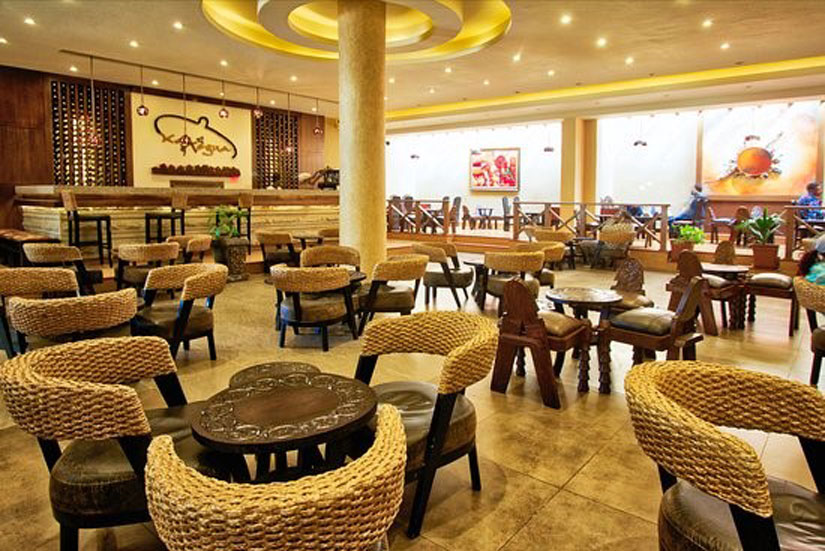
In Addis Ababa, Ethiopia, Kategna Restaurant is a reputable chain of Ethiopian restaurants. They are well-known for both their warm ambiance and their wide menu of authentic Ethiopian food.
Kategna Restaurant offers a diverse menu of Ethiopian dishes, including vegetarian options, firfirs, tibs, wats, and kitfo. They also make fresh injera, a staple Ethiopian flatbread, and host a traditional coffee ceremony, a part of Ethiopian culture. The warm, inviting atmosphere and attentive staff make it a great dining experience.
- Traditional Coffee Ceremony: If you’re curious about Ethiopian customs, you can participate in the traditional coffee ceremony, which entails grinding, roasting, and brewing coffee in a particular pot.
- Extensive menu: They offer firfirs, tibs, wats, kitfo, and vegetarian alternatives, among other Ethiopian delicacies, to suit a range of tastes.
- Authentic experience: Their daily preparation of injera and use of local, fresh ingredients guarantee a genuine Ethiopian dining experience.
- Extremely welcoming atmosphere: The restaurant has a reputation for having a welcoming atmosphere with staff who are responsive and helpful.
- Multiple locations: With multiple locations in Addis Ababa, you may probably find a Kategna Restaurant close to where you are.
- Reasonable prices: Reviews indicate that Kategna offers fair value for the caliber of food and experience, even though particular details were not obtained.
- Noise level: It could become noisy depending on the setup and location, particularly if there are many people there.
- Wait times: Because of its popularity, there may be a wait, particularly at busy periods.
- Touristy: Compared to hidden gems, this well-known restaurant may draw more visitors and have a less authentic feel because of its stellar reputation.
- Kategna offers a diverse menu of Ethiopian dishes, including vegetarian options like Shiro Wat, Misir Wat, Gomen Wat, Fitfit, Firfirs (chopped stews), Tibs (sauteed meat), Wats (stews), and Kitfo (spicy raw minced beef).
3. Dashen Traditional Restaurant (Addis Ababa)
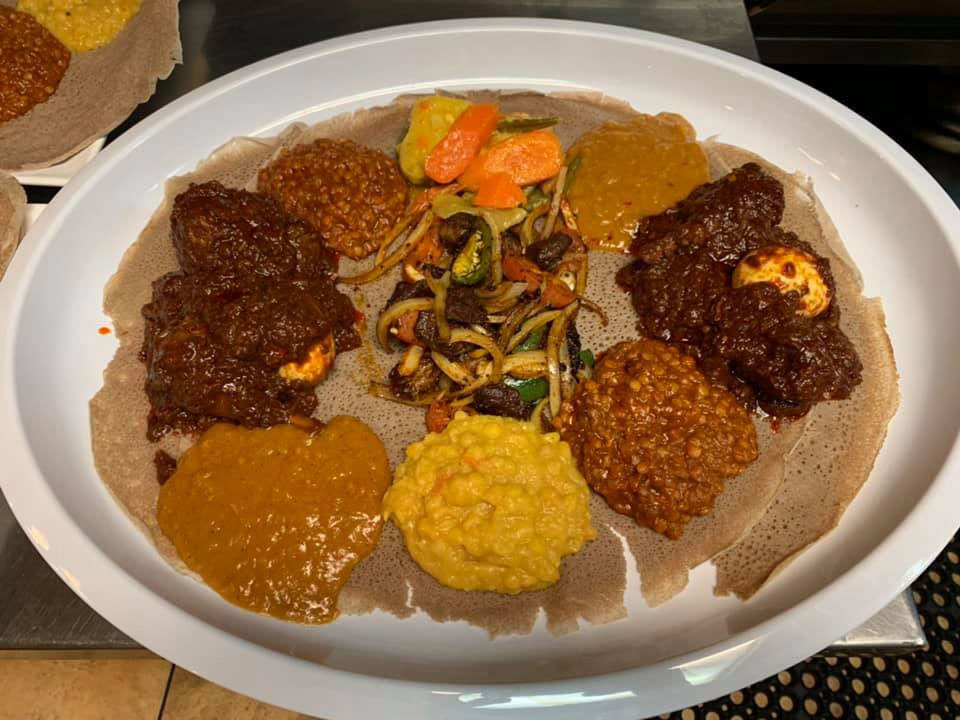
It’s a family-run restaurant serving exquisite Ethiopian dishes made with fresh ingredients and homemade spices in the style of old-world recipes. Its dining spaces are decorated with beautiful artefacts that create a delightful ambiance for an authentic Ethiopian dining experience.
- Catering option: If you’re organizing an event, Dashen offers catering services that let you bring their culinary know-how to the venue of your choice.
- Beverage Variety: In addition to meals, they serve a selection of Ethiopian drinks. Accompany your dinner with Tej, a honey wine, and Areke, flavored organic liquors.
- Coffee ceremony: Enjoy a classic Ethiopian coffee ceremony as a great way to round off your meal.
- Rich culinary experience: Having been in business since 1976, they have a wealth of knowledge that shows in their tasty and genuine Ethiopian food. To ensure a genuine Ethiopian flavor, they use fresh ingredients and handmade seasonings.
- Cultural ambiance: Beautiful Ethiopian cultural artefacts decorate the restaurant’s numerous dining rooms, giving you a sense of being in a traditional atmosphere.
- Live entertainment: As you enjoy your meal, take in live performances and music that will immerse you in Ethiopian culture.
- Potentially spacious: According to reviews, they can accommodate up to 200 people, so there may be plenty of room for bigger gatherings.
- Tourist popularity: As a landmark location, it may draw more visitors, which could have an effect on the authentic atmosphere that certain diners are looking for.
- Limited online reviews: Despite the positive feedback, there may not be many online reviews available, which makes it challenging to obtain a whole picture.
- Uncertainty about wait times: There may not be much information available, particularly during busy times.
- Potentially Expensive: Dashen may be a bit more expensive than other Ethiopian restaurants because of its well-established reputation and emphasis on design.
- Expect a variety of Ethiopian dishes with vegetarian options, seasoned meats like Doro Wat, siga Wat, and spicy minced beef like Kitfo. Sides like injera are a staple for serving stews and vegetables, along with salads or vegetables.
- Enjoy Ethiopian honey wine and local liquors like Tej and Areke, traditional Ethiopian coffee, soft drinks, and tea alongside your meal.
- Get in touch with the eatery. Give them a call to find out about their standard menu items, costs, and serving sizes.
4. Makush Restaurant (Gondar)
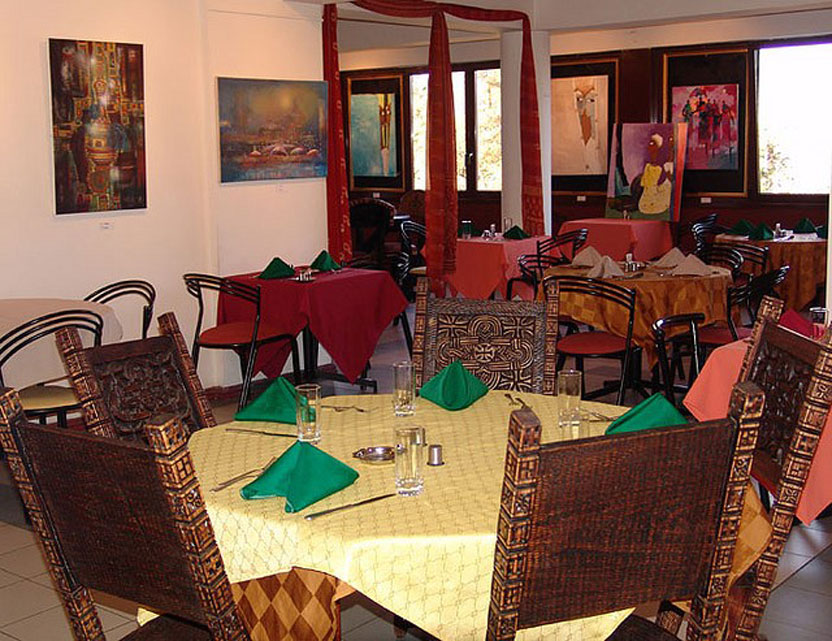
It is known for its exquisitely prepared food with homemade spices and different dining rooms that are decorated with attractive cultural artefacts that are a delight to see.
- Outdoor seating: Dining outside may be a lovely experience as you take in the fresh air and the ambience of Gondar.
- Local experience: It’s possible that Makush restaurant serves a larger percentage of locals, giving them the opportunity to try Ethiopian cuisine in a less touristy atmosphere.
- Authentic Ethiopian cuisine: According to reviews, Makush Restaurant serves delectable, genuine Ethiopian food that lets you taste Ethiopian flavours.
- Warm atmosphere: The restaurant’s ambiance is well-known for being friendly and inviting, which makes for a delightful meal.
- Limited online information: Due to the limitation of online information, locating specifics regarding the menu, costs, and location might be difficult.
- Limited reviews: Although the reviews are generally good, there may not be many of them online, which makes it challenging to have a comprehensive understanding of the restaurant.
- Uncertainty regarding English proficiency: Given the local focus, there’s a chance that the staff’s English language proficiency may be lacking, which could lead to a language barrier.
The menu features Ethiopian staples like vegetable stews, tibs, wats, kitfo, and injera, as well as options like Shiro Wat, Misir Wat, Gomen Wat, Doro Wat, Yebeg Wat, Key Wat, Siga Wat, Alicha Wat, and Yater Alicha.
5. Lucy Restaurant (Lalibela)
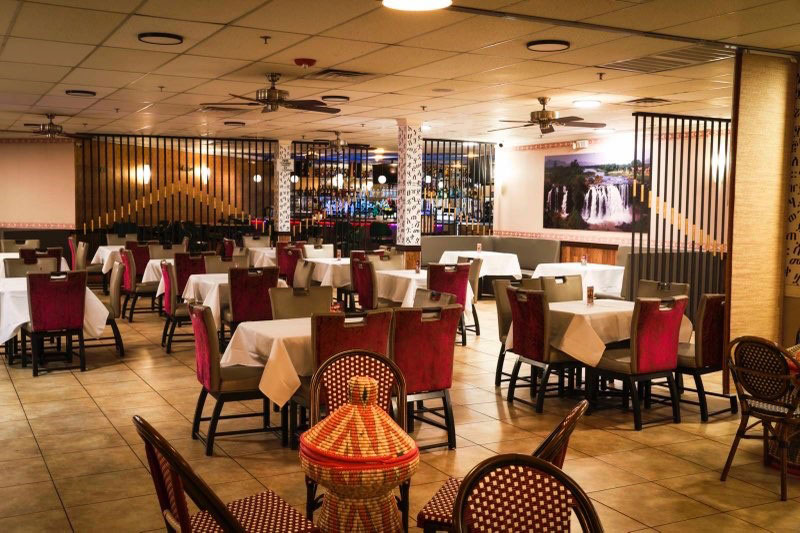
Lucy restaurant is known to be committed to serving authentic Ethiopian foods with top notch services and a great atmosphere.
- Ethiopian culinary experience: Lucy Restaurant follows the standard Ethiopian restaurant format to provide a delicious and authentic Ethiopian dining experience.
- Variety of dishes: Vegetables, roasted meats, and stews made without meat are just a few of the many alternatives for Ethiopian cuisine. At Lucy Restaurant, you will be able to find something that you like.
- Convenient location: Lucy Restaurant is ideally suited for touring the town after your meal because it is situated in Lalibela, a well-liked tourist area.
- Potentially budget-friendly: Ethiopian food is typically recognized for being reasonably priced, particularly when compared with Western dining establishments.
- Potential language barrier: It’s possible that Lucy Restaurant mostly serves locals, and therefore their knowledge of English may be limited.
- Limited online information: It’s challenging to determine with certainty what kind of experience Lucy Restaurant offers because there isn’t a lot of information available online. This includes information on the food, setting, price range, and possible specialties.
- It’s challenging to determine Lucy Restaurant’s environment because there aren’t any easily accessible descriptions or pictures. It might be a laid-back neighbourhood hangout or a more tourist-focused business.
Lucy Restaurant in Lalibela focuses on Ethiopian cuisine, offering a variety of dishes, including vegetarian options like Shiro Wat, seasoned meats like Doro Wat, and stews like Siga Wat, Alicha Wat, and Yater Alicha. They also offer a spicy raw minced beef called Kitfo and a flatbread injera.
PRO TIPS >>> Best Destinations for Adventure Vacation in Africa
Overview of Africa Tourism - Best Food Places You've Got to Visit in Ethiopia

Ethiopia offers a unique culinary experience, with a rich blend of flavours and spices that make its cuisine stand out. Here are some of the best food places you should consider visiting during your trip to Ethiopia: Yod Abyssinia Traditional Restaurant (Addis Ababa), Kategna Restaurant (Addis Ababa), Dashen Traditional Restaurant (Addis Ababa), Makush Restaurant (Gondar), and Lucy Restaurant (Lalibela).
How to Choose Africa Tourism - Best Food Places You've Got to Visit in Ethiopia
Research and recommendations
Read travel blogs, cookbooks, and evaluations of local eateries first. Google Maps, Yelp, and Trip Advisor are a few websites that might offer helpful information about Ethiopia’s top restaurants. Ask friends, relatives, or other travelers who have been to Ethiopia for advice.
Local food
Give preference to eateries serving real Ethiopian food. You can find out about the favourite locations from the locals and hotel workers. They frequently know the best-kept secrets that aren’t always listed on well-known travel websites.
Food safety
Although exploring local cuisines is a must when travelling, food safety should also be taken into account. Seek out eateries with a solid track record when it comes to cleanliness and food handling procedures.
Dining ambience
Select eateries with an appropriate atmosphere based on your tastes. For instance, while some venues offer traditional music and cultural acts, others have a cozy ambiance.
Budget
Take your budget into account while choosing which restaurants to visit. In Ethiopia, prices can differ significantly between restaurants, so pick ones that fit your budget.
Location
Pick restaurants that are easily accessible from your lodging or the sites you want to see. You’ll save money on transportation and time by doing this.
Variety
Make an effort to go to a range of restaurants, from fancy spots to little neighbourhood eateries. You’ll get a deeper understanding of Ethiopian food and dining customs as a result.
Pros and Cons of Africa Tourism - Best Food Places You've Got to Visit in Ethiopia
Pros
- Taste authentic Ethiopian food: Ethiopia offers a chance to experience traditional foods that are exclusive to the nation thanks to its varied culinary scene. Ethiopian food is renowned for its flavorful and fulfilling taste, combining a wide range of spices and flavours.
- Cultural experience: Sharing Ethiopian food with friends and family is a great idea, as it is typically served on a communal plate. You can converse with other diners and establish a connection with the local culture by dining in this manner.
- Vegetarian and vegan options: Because of the Orthodox Christian practice of fasting, Ethiopian food has a large number of vegetarian and vegan meals. Ethiopia is therefore a great place to visit for those who like a plant-based diet.
- Coffee culture: Ethiopia is the home of coffee, and learning about its cuisine will give you an understanding of its distinct coffee culture. You can taste some of the best coffee in the world and take part in customary coffee ceremonies.
- Support local businesses: Eating at restaurants run by locals stimulates the local economy, promoting sustainable travel and community growth.
- Boost your travel experience: Going to Ethiopia and becoming fully immersed in its food culture will make your trip more varied and fulfilling. You can develop a greater knowledge and respect of the nation’s culture and history by trying a range of foods.
- Discovery of local restaurants: By investigating Ethiopia’s top culinary destinations, you can go beyond popular tourist destinations and uncover undiscovered treasures. These tiny, neighbourhood restaurants frequently serve the tastiest, most genuine meals.
Cons
- Food safety is an issue, especially for people with sensitive stomachs, even though most tourists have pleasant experiences with Ethiopian food.
- Ethiopian cuisine is renowned for its aromatic spices, which some people may find to be overly strong.
- Language problems can occasionally present when ordering food in Ethiopia, particularly in rural locations.
- Some visitors may find it strange to eat with their hands and share communal platters as part of Ethiopian dining customs.
What to Watch Out For
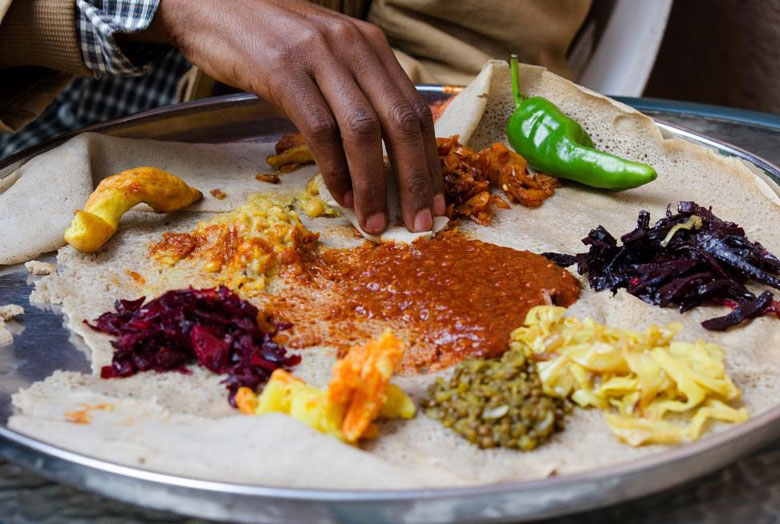
To guarantee a safe and pleasurable trip, there are a few things you should know before you travel to Ethiopia. The following are some things to be aware of:
Security and Safety
Watch out for travel warnings and steer clear of places where there are security issues. When attending sizable public events, exercise caution and keep up with local happenings.
GET SMARTER >>> Africa Tourism – Best Family Journeys in Africa
Cultural sensitivity
Be mindful of regional traditions and customs, dress modestly, and become familiar with some basic Amharic terms. It’s critical to respect regional customs and be conscious of cultural variations.
Health
Make sure you’ve had all the recommended immunizations and take preventative measures to stay healthy. When eating on the street or at local markets, use caution when it comes to food and water hygiene.
Fraud and frauds
Be on the lookout for typical tourist-targeted frauds, such as inflated souvenir pricing or street sellers peddling fake items. When making purchases, always be cautious and learn to haggle over prices beforehand.
Transportation
Be cautious when driving or taking public transportation in Ethiopia because the country’s roads might be difficult. To assist in navigating unknown regions, think about working with a reliable guide or tour operator.
Weather
The climate in Ethiopia varies depending on the region, so pack appropriately and be ready for a range of situations.
Photography
Before taking pictures of people or places of worship, always get permission. Some Ethiopians may not want to have their images taken.
Pro Tips

To make the most of your culinary experiences in Ethiopia, consider the following pro tips:
- Eat with the locals: Sharing a meal with the locals can provide you with a more genuine experience and cultural understanding. A lot of Ethiopians want to share their special recipes with guests since they are so proud of their food.
- Carry Cash: Although credit and debit cards are accepted at some tourist sites, cash is still often utilized in Ethiopia, particularly in rural areas. While Addis Ababa and other major cities have ATMs, it’s a good idea to always have cash on hand for smaller towns and neighbourhood eateries.
- Learn some basic phrases in Amharic: Particularly at neighbourhood restaurants, a few essential phrases like “thank you” (“tenastwal”), “hello” (“ጤና” (テヅ) – tena), “spicy” (“atkilt” – አጥቅልት), and “not spicy” (“aleatkilt” – አለ አጥቅልት) can go a long way in communication.
- Accept the tradition: The Ethiopian coffee ceremony is a lovely, communal event. Join along if you’re invited, and enjoy the flavor and scent of freshly brewed coffee.
- Dress moderately: Even though Ethiopia is becoming a more contemporary country, it is still culturally sensitive to dress modestly, particularly when you are not in one of the big towns. Women should think about covering their knees and shoulders.
Recap
Ethiopia provides a unique mix of stunning scenery, historical attractions, and food unmatched by anything else. The mentioned restaurants will provide a flavor journey with fragrant stews, savory vegetarian options, flavorful tibs, and the iconic injera.
Ethiopian travel can be budget-friendly, especially when it comes to food. Enjoy a memorable and delicious experience filled with unique cultural encounters and unforgettable flavours.





